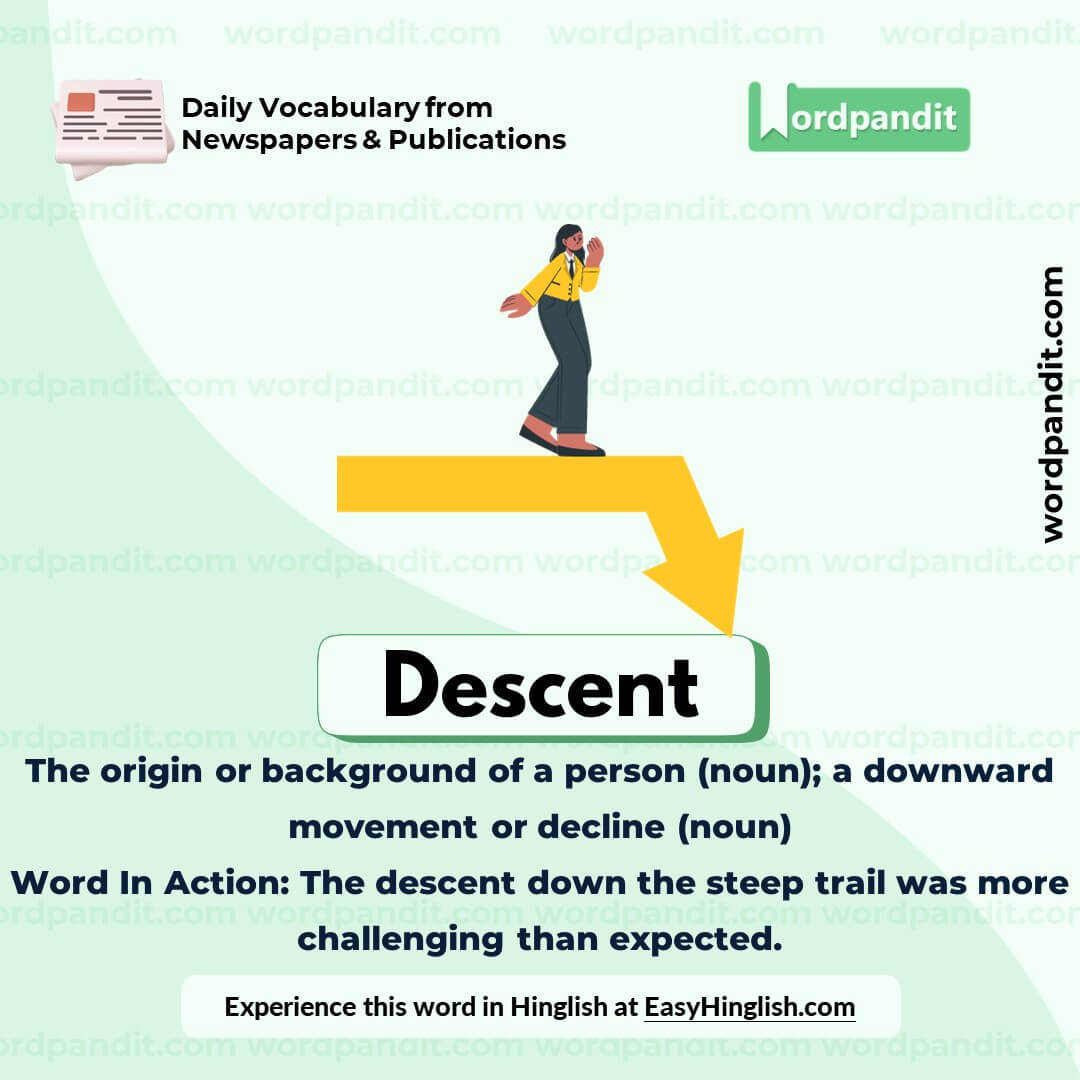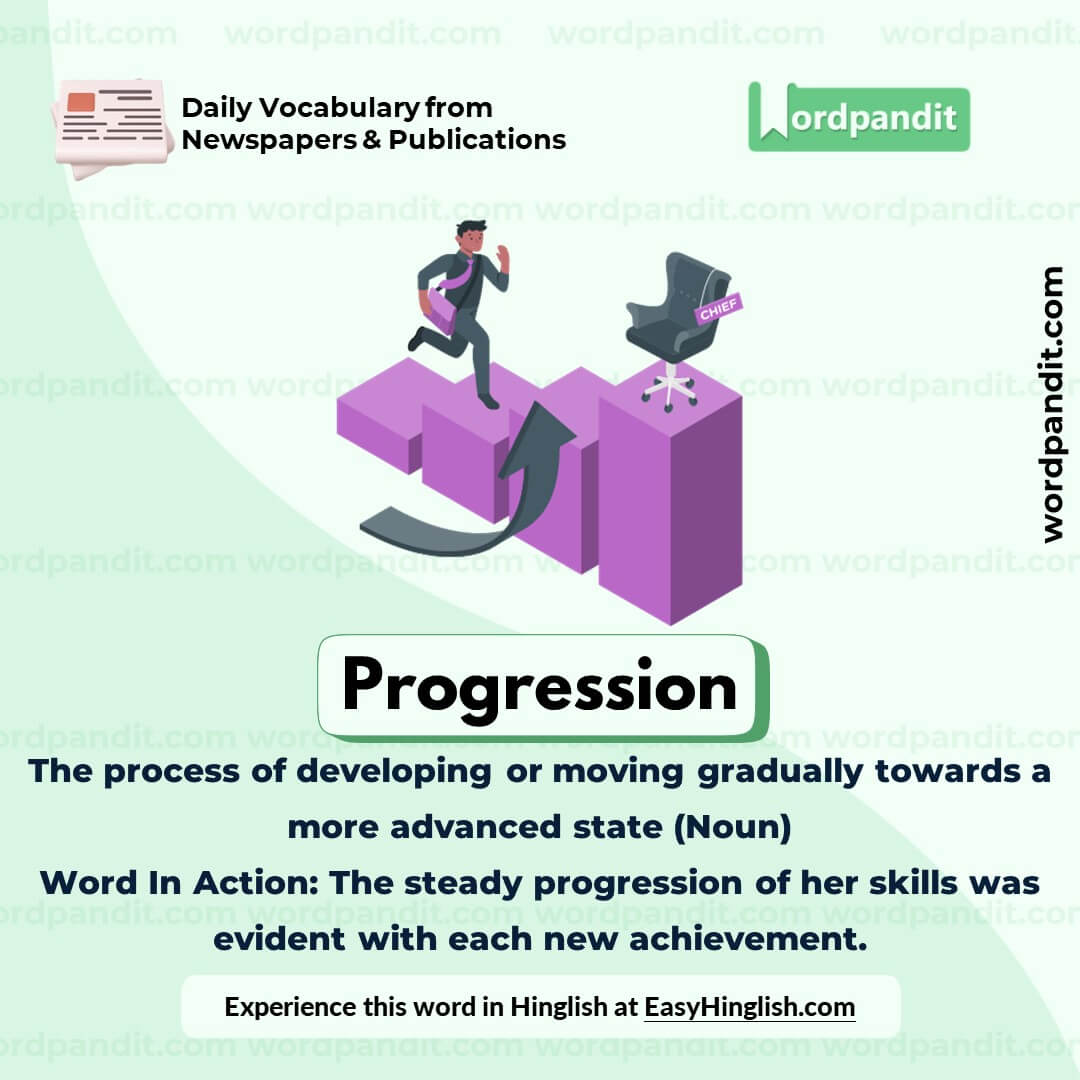Daily Vocabulary from Indian Newspapers and Publications
Welcome to Wordpandit’s Indian Vocabulary Hub
At Wordpandit, we understand the importance of staying rooted in the local context while expanding your language skills. This section focuses on enriching your vocabulary with words and phrases drawn from India’s leading newspapers and publications, ensuring you're learning vocabulary that is practical, relevant, and uniquely Indian.
Why Indian Sources Matter
We believe that the best way to master any language is by immersing yourself in local content. That’s why we carefully curate vocabulary from top Indian publications, including:
- The Hindu
- The Times of India
- The Economic Times
- Hindustan Times
- Live Mint
- The Indian Express
- And many others...
Stay Updated, Stay Relevant
With daily updates from Indian news sources, you’ll be consistently learning words that reflect the trends and shifts in Indian society and culture. Our focus is to provide vocabulary that enhances your understanding of the language in an Indian context.
How Wordpandit Supports Your Goals
Whether you’re preparing for exams, aiming to improve your professional communication, or simply want to stay connected with the latest Indian vocabulary, Wordpandit is here to guide you every step of the way.
Learn with a Practical Approach
Our interactive learning methodology includes real-world examples, engaging activities, and context-specific usage to ensure that every word becomes part of your active vocabulary.
Dive into Indian Vocabulary Today!
Why Choose Wordpandit?
Practical Learning: Focus on words you'll actually encounter in real-world reading, enhancing your comprehension and communication skills.
Diverse Content: From current affairs to scientific breakthroughs, our varied sources expose you to vocabulary across multiple domains.
Effortless Integration: Make Wordpandit a part of your daily routine. Just a few minutes each day can significantly boost your lexicon over time.
Your Path to Vocabulary Mastery
- Visit our Daily Vocabulary section regularly
- Explore new words and their usage in context
- Practice incorporating these words into your own writing and speech
- Track your progress as your vocabulary expands
Start Your Journey Today
Embark on your vocabulary enhancement journey with Wordpandit. By consistently engaging with our daily posts, you'll build a robust vocabulary that serves you well in academic, professional, and personal contexts.
Remember, a word a day keeps linguistic limitations at bay. Make Wordpandit your daily companion in the quest for vocabulary excellence!
WORD-1: Descent
Context:
"Kash Patel, the lawyer of Indian descent Donald Trump has nominated to head the FBI. He promises to bring the might of the state on anyone in government considered insufficiently loyal to Trump." - The Indian Express
Explanatory Paragraph:
The word "descent" refers to the origin or background of a person, particularly concerning their nationality, lineage, or ancestry. It can also signify a downward movement or decline in position or status. In the context provided, "Indian descent" refers to Kash Patel's ancestral background originating from India.
Meaning: The origin or background of a person (noun); a downward movement or decline (noun).
Pronunciation: dih-SENT
Difficulty Level: ⭐⭐ Intermediate
Etymology: Derived from Old French "descente," meaning a decline, and from the Latin "descendere," meaning to climb down.
Synonyms & Antonyms:
Synonyms: lineage, ancestry, origin, plunge, decline
Antonyms: ascent, rise, ancestry (opposite when used for upward movement)
Usage Examples:
- The family proudly traced their descent back to the royal lineage.
- Her descent into the valley was slowed by the rocky terrain.
- Despite his descent from humble beginnings, he achieved great success.
- The plane began its descent as it approached the airport.
Cultural Reference:
"Descent" is often highlighted in discussions of multicultural identity. For instance, Kamala Harris, as the first Vice President of Indian and Jamaican descent, has brought global attention to diverse heritages. - Source: General Reference
Think About It:
How does knowing someone’s descent influence our perception of their identity or their achievements?
Quick Activity:
Identify three historical figures and research their descent. How did their backgrounds shape their contributions to history?
Memory Tip:
Think of "descent" as the opposite of "ascent." Just like you descend a staircase to reach your roots (background), "descent" often refers to lineage or downward motion.
Real-World Application:
The concept of descent is widely used in genealogy to trace family history and in aviation to describe a plane's downward movement. It also appears in cultural discussions emphasizing ethnic identity.
WORD-2: Exert
Context:
"The change of government forthcoming in the US next month could exert an influence the world over, first by emulation." - The Indian Express
Explanatory Paragraph:
The word "exert" refers to the act of applying or putting forth effort, influence, or force to achieve a specific result. It often implies deliberate action or the use of resources like power, authority, or energy in pursuit of a goal.
Meaning: To apply or bring to bear (effort, influence, or force) (Verb)
Pronunciation: ig-ZURT
Difficulty Level: ⭐⭐⭐ Intermediate
Etymology: From Latin "exserere," meaning "to thrust out or stretch forth," which combines "ex-" (out of) and "serere" (to bind or interweave).
Synonyms & Antonyms:
Synonyms: Apply, exercise, utilize, wield
Antonyms: Neglect, ignore, withdraw, withhold
Usage Examples:
- The leader must exert authority to ensure that the rules are followed.
- She exerted all her strength to push the car out of the ditch.
- Parents often exert a significant influence on their children’s career choices.
- The charity’s efforts exerted a positive impact on the lives of underprivileged families.
Cultural Reference:
"The pen is mightier than the sword" reflects the idea that words and ideas can exert a stronger influence than physical force. - Edward Bulwer-Lytton
Think About It:
How does exerting influence differ from using force, and in what situations is one more effective than the other?
Quick Activity:
Write a sentence using "exert" in the context of leadership. Then, write another sentence using it in the context of physical effort.
Memory Tip:
Think of "exert" as “exit” + “energy” – when you exert, you put your energy out of yourself to achieve something.
Real-World Application:
The word "exert" is often used in professional, academic, and everyday contexts to describe the application of effort, such as exerting influence in a meeting, exerting energy during a workout, or exerting authority in a leadership role.
WORD-3: Progression
Context:
"Once I saw progression in myself, I became confident." - Money Control
Explanatory Paragraph:
The term "progression" refers to the act of moving forward or advancing, whether in skills, understanding, or any developmental aspect. It emphasizes a sequence of improvements or steps toward achieving a goal.
Meaning: The process of developing or moving gradually towards a more advanced state. (Noun)
Pronunciation: pruh-GREH-shun
Difficulty Level: ⭐⭐⭐ Intermediate
Etymology: Derived from Latin "progressio," meaning "a going forward or advancement."
Synonyms & Antonyms:
Synonyms: advancement, growth, improvement, development
Antonyms: regression, decline, stagnation
Usage Examples:
- The progression of technology over the past decade has been remarkable.
- She was thrilled to see progression in her fitness levels after months of training.
- Education is a key factor in the progression of society.
- The movie's storyline lacked a clear progression, making it hard to follow.
Cultural Reference:
"Progression" is often associated with Martin Luther King Jr.'s famous quote: "The arc of the moral universe is long, but it bends towards justice," symbolizing the gradual advancement of social change.
Think About It:
What steps or habits can you implement today to ensure consistent progression in your personal or professional life?
Quick Activity:
Write down three areas in your life where you have noticed progression. Reflect on what contributed to these advancements.
Memory Tip:
Remember "progression" by associating it with "progress," which means moving forward or making improvements step by step.
Real-World Application:
In the real world, progression is evident in career growth, academic achievements, and skill acquisition. For example, a progression in coding skills might lead to better job opportunities in the tech industry.
WORD-4: Clout
Context:
"Size matters, and the US is huge on several axes––military force, financial and diplomatic clout, academic leadership, the size of markets." - The Indian Express
Explanatory Paragraph:
The word "clout" refers to the power or influence someone or something has, often in a social, political, or professional context. It signifies the ability to shape opinions, decisions, or outcomes through authority, reputation, or resources.
Meaning: Power, influence, or authority (Noun)
Pronunciation: klout
Difficulty Level: ⭐⭐ Beginner
Etymology: From Middle English "clouten," meaning "to strike with the hand," later evolving to imply metaphorical influence or power.
Synonyms & Antonyms:
Synonyms: Influence, authority, power, leverage
Antonyms: Weakness, insignificance, impotence
Usage Examples:
- Her years of experience in the industry give her significant clout in negotiations.
- The company used its financial clout to acquire several smaller competitors.
- Social media influencers often have clout among younger audiences.
- The senator’s political clout ensured the bill’s passage through the legislature.
Cultural Reference:
In the digital age, social media "clout" is a popular term referring to an individual’s ability to influence opinions and trends, particularly through platforms like Instagram or Twitter.
Think About It:
How does someone gain clout in a field or community, and how should they use it responsibly?
Quick Activity:
Identify a person or organization you believe has clout in a specific field. Write a short paragraph explaining why they hold this influence.
Memory Tip:
Think of "clout" as a “cloud” of influence hovering over a person or entity, affecting everything beneath it.
Real-World Application:
The term "clout" is widely used to describe the power dynamics in politics, business, and social media, making it relevant in understanding leadership, branding, and communication strategies.
WORD-5: Augment
Context:
"The decision to cut CRR by 50 bps will free up Rs 1.16 lakh crore to the banking system, augmenting the lendable resources of banks." - The Indian Express
Explanatory Paragraph:
"Augment" means to increase, enhance, or make something greater in size, value, or effectiveness. In the given context, it refers to how reducing the Cash Reserve Ratio (CRR) will increase the resources available to banks for lending, thereby boosting their ability to provide loans and support economic activity.
Meaning: To make larger, increase, or enhance (verb).
Pronunciation: awg-MENT
Difficulty Level: ⭐⭐ Intermediate
Etymology: From the Latin "augmentare," meaning to increase, and "augere," meaning to grow.
Synonyms & Antonyms:
Synonyms: increase, enhance, expand, boost, improve
Antonyms: decrease, reduce, diminish, shrink, weaken
Usage Examples:
- The government decided to augment healthcare funding to ensure better facilities in rural areas.
- The teacher used multimedia tools to augment the students' learning experience.
- Regular exercise and a balanced diet can augment your overall physical fitness.
- The company augmented its workforce by hiring additional staff to meet the growing demand.
Cultural Reference:
In technology, "augmented reality" refers to the integration of digital content with the real world, such as in games like Pokémon GO, where virtual elements augment the physical environment. - Source: General Reference
Think About It:
What areas of your life could you intentionally augment to achieve greater success or satisfaction?
Quick Activity:
Think of three ways you could augment your daily productivity. Write them down and try implementing them for a week.
Memory Tip:
To remember "augment," think of "augmentation" in movies, where characters gain new abilities or features to enhance their capabilities.
Real-World Application:
"Augment" is commonly used in economics to describe policies aimed at increasing resources or capacity. It is also used in technology, education, and personal development contexts to highlight improvement or enhancement efforts.
















